|
|
|
Sort Order |
|
|
|
Items / Page
|
|
|
|
|
|
|
| Srl | Item |
| 1 |
ID:
118386
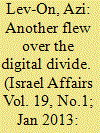

|
|
|
|
|
| Publication |
2013.
|
| Summary/Abstract |
This article is part of a pioneering study which analyses Internet usage by some 600 candidates for heads of 156 local authorities in Israel in the municipal campaigns of 2008. Despite the importance attributed to the municipal elections in the Arab-Palestinian sector in Israel, the high turnout rate, the competitiveness of the elections and the continuing penetration of the Internet, it was scarcely used by candidates, compared to about 50% usage by candidates who competed in municipalities with Jewish populations. Interviews suggest that beyond access gaps, additional obstacles impede the usage of the Internet as an effective political tool in the Arab-Palestinian sector.
|
|
|
|
|
|
|
|
|
|
|
|
|
|
|
|
| 2 |
ID:
111653
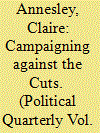

|
|
|
|
|
| Publication |
2012.
|
| Summary/Abstract |
The Coalition's economic strategy poses a significant threat to gender equality in the UK. In the absence of committed gender equality advocates in the government, campaigning is, again, from the outside. This article presents some of the new strategies developed by individuals and organisations such as the Women's Budget Group and the Fawcett Society to fight against the cuts and considers the effectiveness of their approaches.
|
|
|
|
|
|
|
|
|
|
|
|
|
|
|
|
| 3 |
ID:
092666
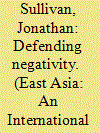

|
|
|
| 4 |
ID:
114574
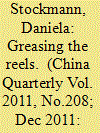

|
|
|
|
|
| Publication |
2011.
|
| Summary/Abstract |
This article examines a major change in campaigning through the means of mass media during the reform era. As the media commercialized and partially privatized, the state has tried increasingly to involve societal actors in the production of public service advertisements (PSAs) on television. Today, PSA campaigns are initiated by state and Party units, but their funding, production and broadcasting is made possible by a collaborative effort between broadcasters, advertising companies and commercial enterprises who voluntarily support their further development. I conducted 27 in-depth interviews with officials, broadcasters and producers in Beijing to tap into the policy rationale behind the use of public service advertisements in campaigning and the incentive structure facilitating collaboration between companies and state units. Interviews with judges of PSA competitions and content analysis of price-winning advertisements reveal the standards of the central government to employ public service advertising as a means of campaigning.
|
|
|
|
|
|
|
|
|
|
|
|
|
|
|
|
| 5 |
ID:
138890
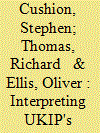

|
|
|
|
|
| Summary/Abstract |
UK broadcasters came under fire for the amount of airtime UKIP and its leader Nigel Farage received after the party won the most votes in the 2014 EU election. Our content analysis of television news during the 2009 and 2014 campaigns found little bias in terms of soundbites, but in the more recent election Farage visually appeared in coverage to a greater degree than other party leaders. Moreover, two core UKIP policies—being in or out of Europe and immigration—dominated coverage in 2014. We suggest the ‘UKIP factor’ and the media's fascination with Nigel Farage help explain why the 2014 campaign was more visible on television news than was the case in 2009 and was largely reported through a Westminster prism. Although television news bulletins attempt to impartially report elections, the 2014 campaign agenda was largely contested on UKIP's ideological terrain and the party's electoral fortunes.
|
|
|
|
|
|
|
|
|
|
|
|
|
|
|
|
| 6 |
ID:
167290
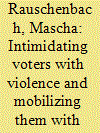

|
|
|
|
|
| Summary/Abstract |
Recent research suggests that intimidating voters and electoral clientelism are two strategies on the menu of manipulation, often used in conjunction. We do not know much, however, about who is targeted with which of these illicit electoral strategies. This article devises and tests a theoretical argument on the targeting of clientelism and intimidation across different voters. We argue that in contexts where violence can be used to influence elections, parties may choose to demobilize swing and opposition voters, which frees up resources to mobilize their likely supporters with clientelism. While past research on this subject has either been purely theoretical or confined to single country studies, we offer a first systematic cross-national and multilevel analysis of clientelism and voter intimidation in seven African countries. We analyze which voters most fear being intimidated with violence and which get targeted with clientelistic benefits, combining new regional-level election data with Afrobarometer survey data. In a multilevel analysis, we model the likelihood of voters being targeted with either strategy as a function of both past election results of the region they live in and their partisan status. We find that voters living in incumbent strongholds are most likely to report having being bribed in elections, whereas those living in opposition strongholds are most fearful of violent intimidation. We further provide suggestive evidence of a difference between incumbent supporters and other voters. We find support that incumbent supporters are more likely to report being targeted with clientelism, and mixed support for the idea that they are less fearful of intimidation. Our findings allow us to define potential hot spots of intimidation. They also provide an explanation for why parties in young democracies concentrate more positive inducements on their own supporters than the swing voter model of campaigning would lead us to expect.
|
|
|
|
|
|
|
|
|
|
|
|
|
|
|
|
| 7 |
ID:
090216
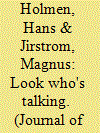

|
|
|
|
|
| Publication |
2009.
|
| Summary/Abstract |
Non-governmental organizations (NGOs) are major players in development aid today. It is widely believed they represent civil society and that, for example, the UN and the World Bank would be strengthened if NGOs were given a larger influence over policy formulation and development. As one can hardly speak of an NGO community, the issue of representation is far from easily solved. NGOs often compete for visibility, clients and influence, and representation leaves a lot to be desired. Hence, governments' and inter-governmental institutions' reluctance to accept immediately NGOs as partners, may be necessary for NGOs to become representative and, paradoxically, for strengthening civil society as well.
|
|
|
|
|
|
|
|
|
|
|
|
|
|
|
|
| 8 |
ID:
111661
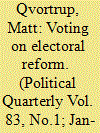

|
|
|
|
|
| Publication |
2012.
|
| Summary/Abstract |
Referendums on electoral systems are relatively rare. In most countries changes to the electoral system are enacted through the legislatures. The British referendum in May 2011 is thus one of the rare examples. In this article it is shown that the apparently idiosyncratic factors in the referendum were consistent with general trends identified in other referendums. While the media focused on the harshness of the campaign, the referendum also resulted in surprising coalitions between long-term foes, thus suggesting that the referendum contributed to cross-party cooperation rarely seen in a majoritarian system like that of Great Britain.
|
|
|
|
|
|
|
|
|
|
|
|
|
|
|
|
|
|
|
|
|